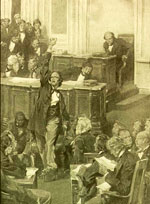Lincoln and Black Abolitionists
Manisha Sinha of the University of Massachusetts, Amherst, looks at the influence of black abolitionists on the policies and views of Abraham Lincoln, and the evolution of Lincoln's views on slavery and emancipation.
Manisha Sinha of the University of Massachusetts, Amherst, looks at the influence of black abolitionists on the policies and views of Abraham Lincoln, and the evolution of Lincoln's views on slavery and emancipation.
Reconstruction after the Civil War was America's first attempt at an interracial democracy. DeWitt Clinton Professor of History at Columbia University Eric Foner explains why an understanding of Reconstruction—and why it failed—is critical to understanding the civil rights movement of the 20th century.
Harriet Tubman was born into slavery in Maryland in 1820. After her escape to the North in 1849, she returned to the South more than a dozen times to ferry other slaves along the Underground Railroad. She later helped John Brown recruit men for his Harper's Ferry raid; and during the Civil War, Tubman served as a Union spy. In this lecture, historian Catherine Clinton details not only Tubman's life but also the quest to uncover new information on Tubman.
Richard Carwardine is Rhodes Professor of American History at Oxford University, author of Lincoln: A Life of Purpose and Power, and winner of the 2004 Lincoln Book Prize. In this lecture, he discusses different aspects of Lincoln's life. Why is Lincoln a mythic figure? How early in his career did he develop his views against slavery? What role did religion play in his life? Professor Carwardine analyzes Lincoln's greatness as well as his humility.
Jill Lepore, Professor of Early American History at Harvard University, speaks about her book, The Name of War: King Philip’s War and the Origins of American Identity, and traces the meanings attached to this brutally destructive war. Lepore examines early colonial accounts that depict King Philip's men as savages and interpret the war as a punishment from God, discusses how the narrative of the war is retold a century later to rouse anti-British sentiment during the Revolution, and finally describes how the story of King Philip is transformed yet again in the early 19th century to portray him as a proud ancestor and American patriot.

Nineteenth-century African American pamphlets and documents, most produced between 1875 and 1900, are presented on this website. These 350 works include sermons, organization reports, college catalogs, graduation orations, slave narratives, Congressional speeches, poetry, and play scripts.
Topics cover segregation, civil rights, violence against African Americans, and the African colonization movement. Authors include Frederick Douglass, Booker T. Washington, Ida B. Wells-Barnett, Benjamin W. Arnett, Alexander Crummel, and Emanuel Love. Publication information and short content descriptions accompany each pamphlet.
The site also offers a timeline of African American history from 1852 to 1925 and reproductions of original documents and illustrations. A special presentation "The Progress of a People," recreates a meeting of the National Afro-American Council in December 1898. This is a rich resource for studying 19th- and early 20th-century African American leaders and representatives of African American religious, civic, and social organizations.

Created as a companion to the PBS series of the same name, this well-produced site traces the history of Africans in America through Reconstruction in four chronological parts. The site provides 245 documents, images, and maps linked to a narrative essay.
"The Terrible Transformation" (14501750) deals with the beginning of the slave trade and slavery's growth. "Revolution" (17501805) discusses the justifications for slavery in the new nation. "Brotherly Love" (17911831) traces the development of the abolition movement. "Judgment Day" (18311865) describes debates over slavery, strengthening of sectionalism, and the Civil War. In addition to the documents, images, maps, and essay (approximately 1,500 words per section), the site presents 153 brief (150-word) descriptions by historians of specific aspects on the history of slavery, abolition, and war in America. The site provides a valuable introduction to the study of African-American history through the Civil War.
Hope Smith of Colonial Williamsburg talks about the work and fate of black women who followed the British army during the American Revolution, hoping to find their freedom.
Dennis Watson, who portrays royal governor Lord Dunmore at Colonial Williamsburg, talks about the governor's actions prior to and during the American RevolutionᾹincluding his removal of the powder from the Williamsburg Powder Magazine and his issuing of a proclamation promising slaves freedom if they joined the British in the war.
Valarie Holmes, an interpreter at Colonial Williamsburg, discusses the life of slave Lydia Broadnax, cook to George Wythe, whose role she plays.